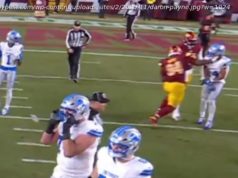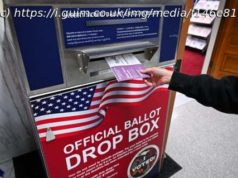 NEW YORK — With protesters’ chants echoing through arrival halls, confusion prevailed Sunday at airports across the United States amid seemingly contradictory signals from the Trump administration over a hotly contested executive order blocking U. S. entry to refugees and nationals of seven Muslim-majority nations.
NEW YORK — With protesters’ chants echoing through arrival halls, confusion prevailed Sunday at airports across the United States amid seemingly contradictory signals from the Trump administration over a hotly contested executive order blocking U. S. entry to refugees and nationals of seven Muslim-majority nations.
Advocacy groups and administration officials remained on an apparent collision course over the order, which since its signing on Friday has led to the detention of more than 100 people landing at airports across the country with valid entry documents.
About twice as many others were denied permission to board flights to the United States, according to lawyers representing a consortium of groups that won a temporary nationwide stay Saturday night against the deportation of anyone who had arrived with a valid visa.
Groups including the American Civil Liberties Union said they would ultimately press to have Trump’s order overturned as unconstitutional. In the meantime, the emergency stay issued by a federal judge in Brooklyn represented an “absolute baseline” prohibiting the removal of any of those who were stopped upon arrival, said Lee Gelernt, the deputy director of the ACLU’s Immigrants’ Rights Project.
But it remained essentially the luck of the draw in terms of who was stopped, who was released after questioning, and who had access to legal counsel if they were detained, the lawyers said.
“There’s no method to this madness,” said Becca Heller, director of the International Refugee Assistance Project, another of the groups that filed the legal challenge in New York.
For some, the directive’s second full day brought a reprise of anxiety and heartbreak from the day before. Hind Mohamed traveled to Kennedy Airport from New Jersey with her family, hoping to greet her mother, a green-card holder traveling from Sudan who had been due to arrive Saturday. But her initial flight was delayed, and then she was rerouted to Saudi Arabia.
Her mother’s flight from Riyadh had been on the ground an hour, but there was no immediate sign of her. “I’m just nervous,” Mohamed said.
Her son, Awab Hassan, kept a close eye out for his grandmother; he offered a teen’s unvarnished take on the executive order, saying it lumped together terrorists and innocent people.
“That’s not justice — to see this country devolve, I’m not proud of that,” he said. “Where’s the feeling of taking people in, sharing the American Dream? Instead of shoving them back into a life of insecurity?”
In some cases, customs and border officials were taking it upon themselves to ignore judges’ rulings, lawyers and some local officials said. International airports at San Francisco and Washington Dulles were reported to be denying access to the lawyers who offered free services.
Los Angeles City Attorney Mike Feuer spent the early hours of Sunday at Los Angeles International Airport, but said he was repeatedly denied access to detainees and was unable to get an official count of those who had been stopped on entry.
In Chicago, there was said to be greater leniency in releasing those initially detained, and in Boston, where a judge’s order appeared to guarantee landing rights to anyone with a valid visa during the coming week, legal observers were watching for an increase in arrivals.
As anguish mounted among families uncertain of loved ones’ fate, the Trump administration insisted that enforcement of the president’s directive would be unaffected by a flurry of court rulings temporarily forbidding deportation of those who arrived with valid visas.
“Prohibited travel will remain prohibited,” the Department of Homeland Security said in a statement, adding that the government retains the right to revoke visas on national-security grounds. The directive blocked all refugee arrivals for 120 days — refugees from Syria are blocked indefinitely — and suspended entry by people holding passports from Syria, Sudan, Somalia, Iran, Iraq, Yemen and Libya.
But White House chief of staff Reince Priebus, appeared to walk back a major element of the order, which initially stopped the usual automatic U. S. entry normally given to heavily vetted permanent U. S. residents —green-card holders — from the seven affected countries.
“As far as green-card holders, moving forward, it doesn’t affect them,” Priebus said on NBC’s “Meet the Press.” It was not clear whether he was referring to green-card holders being permitted to remain in the country, and re-enter after travel if they passed additional security screening.
A day after House Speaker Paul Ryan was one of relatively few Republicans to voice an active defense, two Senate Republican heavyweights — Arizona’s John McCain and South Carolina’s Lindsey Graham — weighed in with a strongly worded joint statement warning against a “self-inflicted wound in the fight against terrorism.”
“It is clear from the confusion at airports across our nation that President Trump’s executive order was not properly vetted,” the statement said, in a pointed reference to Trump’s repeated contention that despite a rigorous existing security process, arrivals until now have not been properly “vetted.”
“Our government has a responsibility to defend our borders, but we must do so in a way that makes us safer and upholds all that is decent and exceptional about our nation,” they said.
Trump weighed in with a Sunday morning Twitter post saying the U. S. needs “strong borders and extreme vetting, NOW.” The President also decried what he called a “horrible mess” regarding immigration in other parts of the world, including Europe.
European leaders have expressed shock and dismay over Trump’s directive, and some U. S. allies were taken aback by the blocked entry of their own nationals with dual passports from one of the affected countries in the presidential order. British news reports said Foreign Secretary Boris Johnson had been instructed to ask the Trump administration for an exemption from the travel ban for British citizens, even if they were natives of one of the affected countries.
Immigration advocates and the Trump administration offered clashing narratives as to the first full day’s rollout of the executive directive. The Department of Homeland Security said fewer than 1 percent of international arriving travelers on Saturday had been “inconvenienced” by the president’s directive.
Home
United States
USA — mix Confusion reigns at US airports on 2nd day of protesting Trump refugee...






